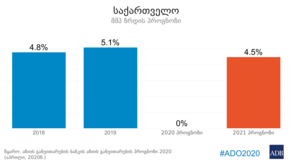
The Asian Development Bank expects the Georgian economy to mitigate in 2020 due to the COVID-19 pandemic as the oil prices have decreased.
As the bank forecasts, Georgia will be able to recover due to increased domestic demand and direct foreign investments in 2021, as well as using money transfers.
As per the ADB report, the Georgian GDP growth will drop to 0% in response to the pandemic, oil price decrease, reduced consumption, tourism, and trade, but Georgia's economy will resume by 4,5% in 2021.
ADB Georgia Office Director Shane Rosenthal said more support of the private sector and investments in modern technology, science, and digital education would facilitate the fast recovery of the country.
''Gains in retail trade and higher government spending on education are forecast to boost services by 1.1% in 2020. The figure is projected to rise to 6.3% in 2021 as tourism recovers. Growth in industry, meanwhile, is projected to contract to 3.1% in 2020 due to a slowdown in construction and manufacturing, before recovering to 2.1% in 2021 with higher mining output,'' the report says.
Under the report, inflation is projected to slow to 4.5% in 2020 and 3.0% in 2021—in line with the central bank's target—as a result of the introduction of administered prices on food.
Georgia's external prospects will depend heavily on developments in its trading partners. The current account deficit is projected to narrow further to 4.4% of GDP in 2020 and 4.2% in 2021, with a continued decline in imports as much lower oil prices help trim the trade deficit.
Exports are projected to grow by 3.6% in 2020 and by 11.9% in 2021, while modest domestic expansion and higher FDI are expected to raise imports by 1.1% in 2020 and by 7.0% in 2021.
Risks to economic growth include greater than expected sluggishness in trading partners' economies, weaker than expected domestic demand, slower growth in tourism revenues, and tighter liquidity in global financial markets, in part reflecting the impact of COVID-19, the report reads.































Bela Gelashvili
News Author